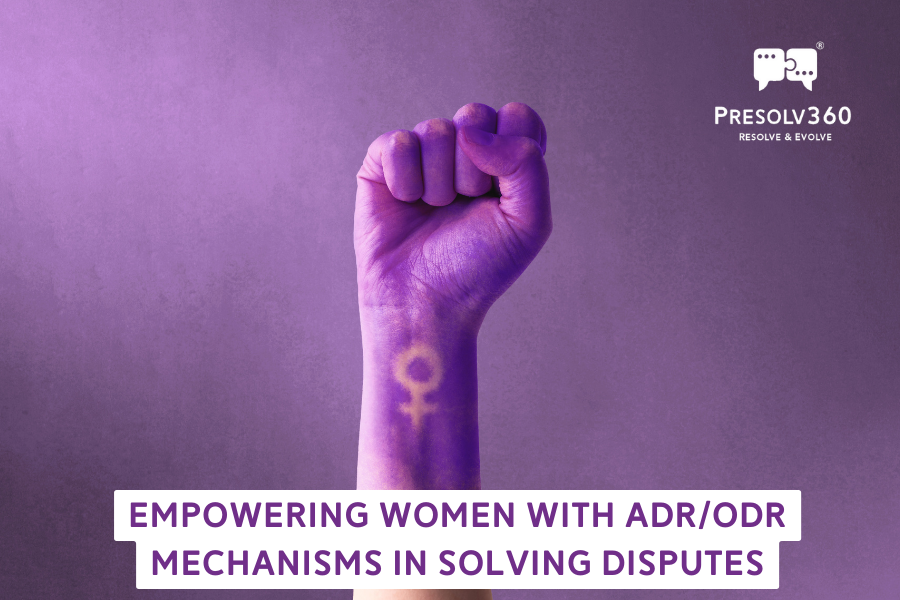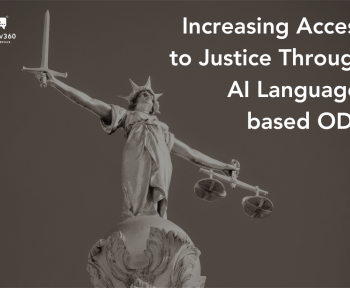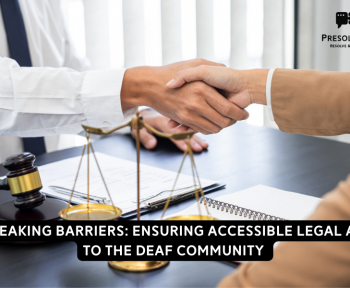Disputes and conflicts are an unfortunate reality in our society. And women often bear the brunt of various forms of gender-based discrimination, violence, and inequality. However, there has been a growing recognition of the need to address these issues effectively. In recent years, Alternative Dispute Resolution (ADR) and Online Dispute Resolution (ODR) have emerged as powerful tools in this pursuit.
ADR/ODR offer an opportunity to empower women by providing accessible, efficient, and inclusive platforms to resolve disputes around women’s issues. These mechanisms prioritize collaboration, dialogue, and creative problem-solving over confrontational and adversarial approaches. By promoting communication and understanding, ADR/ODR mechanisms enable parties to work towards mutually beneficial solutions in a supportive environment.
One cannot overstate the significance of ADR/ODR mechanisms in solving disputes concerning women’s issues. Traditional litigation processes can be daunting and challenging for women, marginalizing them further and discouraging them from seeking justice. ADR/ODR mechanisms, on the other hand, offer a more accessible and user-friendly alternative.
Women facing disputes related to sensitive and deeply personal issues often seek privacy and confidentiality. These disputes can be around extremely private encounters with domestic violence, sexual harassment, or discrimination. ADR/ODR mechanisms provide a safe and secure space where women can share their experiences without fear of judgment or retaliation. This privacy fosters trust and encourages more women to come forward and seek resolution.
By harnessing ADR/ODR, we can create a more equitable and just society that hears women’s voices and protects their rights.
The types of ADR
Alternative Dispute Resolution (ADR) encompasses a range of methods that offer parties involved in a dispute an alternative to going to court. ADR methods include negotiation, mediation, arbitration, and conciliation. These approaches prioritize communication, understanding, and collaboration to reach mutually agreeable solutions. A neutral third party, such as a mediator or arbitrator, can facilitate the resolution process.
- Negotiation: Negotiation is voluntary, and an informal process where parties directly communicate and attempt to find a mutually acceptable agreement. It allows the parties to control the outcome and encourages compromise. Negotiation can be directly between individuals or with the assistance of legal representatives.
- Mediation: Mediation involves a neutral third party, the mediator, who facilitates communication between the disputing parties. The mediator helps identify common interests, explores options, and assists in generating solutions. Mediation is a confidential process that empowers the parties to find their own resolutions, while the mediator ensures a fair and balanced process.
- Arbitration: Arbitration is a more formal process where an appointed arbitrator or panel of arbitrators makes a binding decision on the dispute. Parties present their case and evidence to the arbitrator, who then renders a decision. Arbitration can be either binding or non-binding, depending on the agreement of the parties involved.
The Types of ODR
Online Dispute Resolution (ODR) utilizes technology and the internet to facilitate the resolution of disputes. It provides a convenient and accessible platform for parties to engage in dispute resolution processes remotely. ODR can encompass various methods, including online negotiation, mediation, and arbitration.
- Online Negotiation: Online Negotiation involves parties engaging in discussions and negotiations through digital platforms, such as emails or online chat systems. It provides flexibility and convenience, allowing parties to communicate asynchronously and overcome geographical barriers.
- Online Mediation: Online Mediation takes place through virtual platforms specifically designed for mediation sessions. Parties and the mediator connect remotely, utilizing video conferencing tools and secure online platforms. Online mediation offers similar benefits to traditional mediation, such as privacy, flexibility, and the opportunity for active involvement of the parties in the resolution process.
- Online Arbitration: Online arbitration involves the use of technology to conduct arbitration proceedings remotely. Parties present their cases, evidence, and arguments through online platforms. The arbitrator or panel of arbitrators reviews the submissions and renders a decision that is enforceable.
ADR and ODR mechanisms offer greater efficiency, cost-effectiveness, and the ability to provide more accessible and inclusive dispute-resolution options. These mechanisms can significantly benefit women facing disputes related to gender-based discrimination, violence, and inequality, providing them with empowering alternatives to traditional legal processes.
The Importance of ADR/ODR in Women’s Issues
ADR/ODR mechanisms offer a few salient features that are particularly important when it comes to conflicts that affect women:
Accessibility
ADR/ODR mechanisms provide a more accessible platform for women to seek justice. Traditional court systems often pose barriers that can deter women from pursuing their rights. High costs, geographical limitations, and lengthy procedures make accessing justice difficult, particularly for women from marginalized communities. ADR/ODR mechanisms can be easily accessed from any location, reducing physical and financial barriers. This enables women, regardless of their socio-economic backgrounds, to seek resolution and have their voices heard.
Privacy and Safety
Women facing disputes related to sensitive issues such as domestic violence, sexual harassment, or discrimination often prefer privacy and confidentiality. ADR/ODR mechanisms offer a safe and secure environment where women can share their experiences without fear of retaliation or judgment. By providing anonymity and confidentiality, these mechanisms encourage more women to come forward and seek justice. This privacy fosters trust and allows women to share their stories openly, knowing that their safety and well-being are prioritized.
Empowerment
ADR/ODR mechanisms prioritize the empowerment of women by giving them an active role in the resolution process. Unlike traditional legal processes that can be intimidating and disempowering, ADR/ODR mechanisms enable women to directly participate in negotiations, express their concerns, and have their voices heard. This active involvement boosts women’s confidence and agency, ensuring that their perspectives and needs are considered during the resolution process. Empowered women are more likely to assert their rights and challenge gender-based discrimination.
Customization and Sensitivity
ADR/ODR mechanisms can be tailored to suit the unique needs of women, considering their cultural, social, and emotional aspects. Mediators and arbitrators in ADR/ODR processes can be trained in gender sensitivity and understanding the specific challenges faced by women. This approach fosters a supportive and empathetic environment that promotes fair and equitable resolutions. Women can feel understood and validated, leading to more satisfactory outcomes. A customized approach recognizes the diverse experiences of women and acknowledges the impact of gender norms and biases in disputes.
Speed and Efficiency
Lengthy legal proceedings can be overwhelming and exhausting for women seeking resolution. ADR/ODR mechanisms are known for their efficiency and timely resolutions, saving women from prolonged stress and trauma. Quick dispute resolution allows women to move forward with their lives, rebuild their confidence, and focus on personal and professional growth. Additionally, the efficient nature of ADR/ODR mechanisms reduces the backlog in traditional courts, freeing up resources and improving access to justice for all.
Empirical Evidence
Numerous studies and empirical evidence support the effectiveness of ADR mechanisms in addressing women’s issues. Research has shown that women who engage in ADR processes report higher levels of satisfaction and empowerment compared to those involved in traditional litigation. ADR/ODR mechanisms have also been found to facilitate greater communication, cooperation, and understanding between parties, leading to more sustainable and mutually beneficial resolutions.
Success Stories of ADR/ODR Mechanisms in Women’s Issues
There have been more than a few successful implementations of ADR/ODR mechanisms to resolve women-specific issues:
Mediation and Conciliation Project Committee (MCPC) – India
The MCPC was established to promote mediation as a preferred method for resolving matrimonial disputes, including cases of domestic violence. Through a network of trained mediators, the MCPC successfully resolved a significant number of cases, ensuring fair settlements and reducing the burden on the court system. Mediation provided a safe and supportive environment for women to voice their concerns and actively participate in the resolution process. The success of the MCPC highlights the transformative potential of mediation in addressing women’s issues.
Workplace Mediation Programmes – Canada
Workplace mediation programmes have proven effective in resolving conflicts related to workplace harassment and discrimination. These programs offer a confidential and voluntary process where trained mediators facilitate discussions between parties. By providing a neutral and empowering environment, workplace mediation allows women to address their concerns, seek resolution, and foster better working relationships. The success of these programs demonstrates the positive impact of ADR and ODR in creating safer and more inclusive work environments for women.
Online Platforms for Reporting Abuse – Global
Online platforms and initiatives dedicated to addressing gender-based abuse, such as online harassment and cyberbullying, have emerged as powerful tools for women’s empowerment. These platforms provide women with a safe space to report incidents, seek support, and access resources. With the assistance of trained moderators and innovative technological features, online platforms have been successful in promoting accountability, fostering online safety, and empowering women to reclaim their digital spaces.
Implementation Challenges Faced By ADR/ODR Mechanisms
However, these successes have also been accompanied by a fair number of challenges:
Awareness and Accessibility
One of the key challenges in implementing ADR/ODR mechanisms for women’s issues is the lack of awareness among women, especially those from marginalized communities. Many women may not be aware of the existence and benefits of these mechanisms, making it crucial to conduct outreach programmes, awareness campaigns, and legal education initiatives to ensure equal access to justice for all women. Efforts should be made to disseminate information through community networks, legal aid centres, and social media platforms.
Digital Divide
Despite advancements in technology, the digital divide remains a significant obstacle in implementing ODR mechanisms, particularly in developing countries. Limited internet access, lack of digital literacy, and language barriers prevent some women from effectively utilizing online platforms for dispute resolution. To address this challenge, it is necessary to bridge the digital divide through initiatives such as providing internet access in rural areas, offering digital literacy training, and developing user-friendly multilingual platforms.
Legal Recognition and Enforcement
Ongoing efforts are being made to mainstream ADR/ODR by developing legislation and regulations that recognize and enforce their outcomes. The introduction of the Mediation Bill and endorsement by influential figures, such as Chief Justice of India DY Chandrachud, highlight the importance of these mechanisms. Cross-jurisdictional enforcement mechanisms are also being established. Strengthening collaboration between legal professionals and ADR/ODR practitioners is vital to ensure fair and enforceable resolutions for women and all parties involved.
Gender Sensitivity and Training
ADR/ODR practitioners must undergo gender sensitivity training to understand the unique challenges faced by women and create an inclusive environment. Gender biases and stereotypes can influence the resolution process, and practitioners need to recognize and address these biases. Training programmes should focus on promoting empathy, cultural sensitivity, and an understanding of power dynamics to ensure that women feel safe, heard, and respected throughout the resolution process.
Conclusion
In the pursuit of gender equality and justice, Alternative Dispute Resolution (ADR) and Online Dispute Resolution (ODR) mechanisms have emerged as powerful tools for addressing disputes related to women’s issues. The significance of these mechanisms lies in their ability to provide accessible, inclusive, and empowering platforms for women to seek resolution. By focusing on education and awareness, bridging the digital divide, ensuring legal recognition, and promoting gender sensitivity, we can unlock the full potential of ADR/ODR in empowering women, ultimately contributing to a more equitable and just society.




